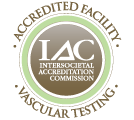Knee Arthritis and Pain
Genicular Artery Embolization (GAE)
Osteoarthritis (OA) of the knee is a degenerative joint disease which causes pain, stiffness, and decreased mobility due to worn down cartilage in the knee joint. OA is the most common joint disorder in the United States, effecting 10% of men and 13% of women 60 years and older. Genicular Artery Embolization (GAE) is a minimally invasive procedure to treat knee pain that is caused by osteoarthritis. Patients with moderate to severe knee pain that are not ready for traditional knee surgery, or may not be candidates for knee surgery, can see a reduction in knee pain and swelling after treatment. It is often considered after patients have had minimal to no relief with medications or joint injections.
Symptoms of knee arthritis:
- Pain and swelling in the knee joint
- Stiffness in the knee joint
- Difficulty walking up and down stairs
- Difficulty walking on flat surfaces
- Tenderness in the area around the knee
Treatments for knee arthritis and pain:
- Weight loss and physical therapy
- Joint injections and medications
- Knee replacement surgery
- Genicular Artery Embolization (GAE)
Who may benefit from Genicular Artery Embolization (GAE)?
Patients with moderate to severe knee pain that are not ready for traditional knee surgery, or may not be candidates for knee surgery, can see a reduction in knee pain and swelling after treatment. It is often considered after patients have had minimal to no relief with medications or joint injections.
Our Board-Certified Vascular Surgeons specializing in Genicular Artery Embolization (GAE).
Genicular Artery Embolization (GAE) is performed by our vascular surgeons in the comfort of our offices under moderate (twilight) sedation. A small catheter is placed into the artery in the upper leg and then navigated under x-ray guidance to the arteries feeding the knee. Once the genicular artery feeding the inflamed area is identified, microscopic embolization particles are slowly injected into the genicular artery. Blood flow is preserved to the remainder of the knee and the surrounding tissue. Patients then recover for 1-2 hours in our recovery room and are discharged home same day with minimal restrictions.
What to expect following a Genicular Artery Embolization (GAE).
Genicular Artery Embolization (GAE) has been shown to reduce knee pain by at least 50% in greater than 70% of the patients who are treated with it. This relief can begin as soon as a few days after the procedure. The resultant reduction in pain has been demonstrated to last for up to four years on average.
Will Genicular Artery Embolization (GAE) interfere with knee replacement surgery in the future?
Genicular Artery Embolization (GAE) is a minimally invasive procedure that should not interfere with any future knee surgery.
Does my insurance cover this procedure?
Our authorization team will work with your insurance company to obtain authorization for your procedure. In our experience, coverage is available for most patients based on their medical history and examination. Please make an appointment with one of our vascular surgeons for an evaluation and to discuss your personalized vascular care plan.










